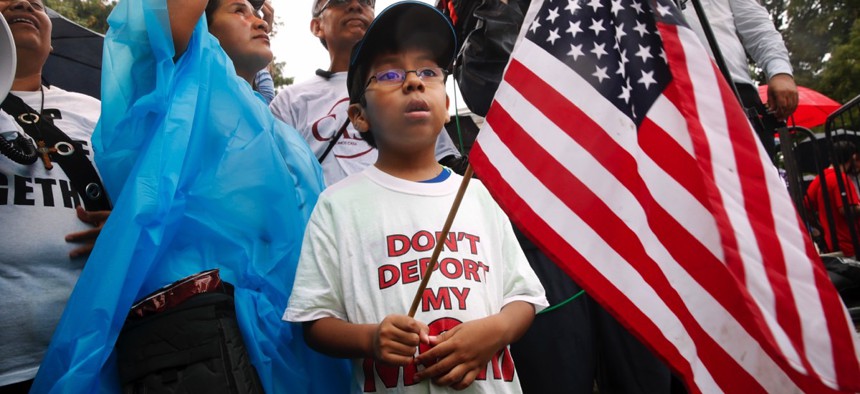Mayors Back Dreamers Ahead of Trump DACA Decision

Michael Claros, 8, of Silver Spring, Maryland attends a rally for immigration reform on Aug. 15 outside the White House. Jacquelyn Martin / AP Photo
Should the president rescind deportation protections for the young immigrants, Republican House Speaker Paul Ryan hinted at a humane “legislative solution.”
U.S. mayors and immigration law experts fear the worst with President Trump signaling Tuesday on Twitter his intention to end the popular Deferred Action for Childhood Arrivals program but leave Congress six months to pass replacement legislation. Should lawmakers fail to act, questions linger about whether the president will actually follow through with termination.
“We love the Dreamers,” Trump said, ahead of his choice. “We love everybody … We think the Dreamers are terrific.”
DACA protects about 787,000 Dreamers, undocumented immigrants brought to the U.S. by their parents as children, from deportation.
“Terminating the program would be an abject disaster for not only them but their families, our communities and the country,” said Marshall Fitz, managing director of immigration for the Palo Alto, California-based philanthropy Emerson Collective, on a Friday conference call.
Texas Attorney General Ken Paxton, a Republican, and nine other GOP state attorneys general on Thursday delivered an ultimatum to U.S. Attorney General Jeff Sessions that Homeland Security either phase out DACA or see a lawsuit over the Deferred Action for Parents of Americans program amended to include the former as well.
Alabama, Arkansas, Idaho, Kansas, Louisiana, Nebraska, South Carolina, Tennessee and West Virginia’s AGs cosigned the letter giving Trump until Sept. 5 to act—a “manufactured political deadline … the White House is playing along with,” Fitz said.
Federal District Court Judge Andrew Hanen, a George W. Bush appointee in Texas, is viewed as amenable to amendment, even though he’s issued no such legal deadline, and could accept as soon as Sept. 6 or 7.
“If they really believed DACA was unconstitutional, they would have sued over that five years ago,” said Marielina Hincapie, National Immigration Law Center executive director, on the call.
Every two years Dreamers must reapply for work authorization, so phasing out DACA would see their job clearance expire—rendering them subject to deportation. Expirations would occur for an average of 1,400 Dreamers a day and 8,000 a week.
While the state AGs’ letter doesn’t require the removal of Dreamers, U.S. Immigration & Customs Enforcement is rumored to be seeking a list of names, Fitz said, and has already picked up DACA recipients to use as collateral in other enforcement actions or obtain information.
Should Trump opt to leave DACA in place, a legal challenge to any Texas amendment to its lawsuit is likely. Using the Administrative Procedure Act or equal protection clause of the Fourteenth Amendment are two possible avenues, depending on the language of Trump’s announcement, Hincapie said.
Sessions, an outlier among Republicans when it comes to DACA, has questioned the constitutionality of former President Obama’s executive order creating the program, so it’s unlikely he’d have DOJ defend it in court, Fitz said.
Fellow hardliner Kansas Attorney General Kris Kobach urged Trump to end DACA on Friday arguing it’s stymied the deportation of “gangbangers.” But arrestees of gangs like MS-13 are predominantly U.S. citizens, and DACA recipients undergo significant background checks rendering Kobach’s critique “irrelevant” and “fear-mongering,” Fitz said.
“Kris Kobach is the architect of the ‘attrition through enforcement’ strategy at the state level,” Hincapie said, adding that strategy is being exported to the national level via Sessions.
Republican U.S. House Speaker Paul Ryan, while criticizing Obama’s creation of DACA, said he doesn’t think Trump should eliminate the program in a Friday radio interview—floating a “legislative solution.”
There are a number of opportunities for Congress to act on, including North Carolina Sen. Thom Tillis’ Republican ‘Dream Act’—viewed as a win-win for Trump, who promised to end DACA on the campaign trail but also to treat Dreamers “with heart” in February. There’s also the Democratic American Hope Act.
“They could move very quickly,” said Tyler Moran, D.C. Immigration Hub managing director, of Congress.
A number of mayors came out in support of DACA ahead of the president’s decision.
“President Trump’s impending decision to terminate DACA, should it transpire, will leave a shameful mark in history as this administration’s rock bottom. Ending DACA abandons the American spirit of diversity, inclusion, and possibility. This immoral and cruel decision betrays our values and our promises,” said San José Mayor Sam Liccardo in a statement. “To all our San José Dreamers: know that the San José Police Department will not participate in ICE investigation or enforcement. Here in San José, we’ve got your back.”
UPDATE: This article has been updated to reflect President Trump's impending decision to rescind DACA with a six-month delay for a possible legislative solution to emerge.
Dave Nyczepir is a News Editor at Government Executive’s Route Fifty and is based in Washington, D.C.
NEXT STORY: Vulnerable Communities Lose Critical Documentation in Natural Disasters' Wake






